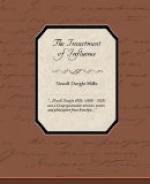History is full of these transformations wrought by the heart. It was a new enthusiasm that changed Augustine the epicurean into Augustine the church father. It was a new enthusiasm that turned Howard the pleasure-lover into Howard the prison-reformer. It was a glowing heart that lent power to Mazzini and Garibaldi and gave Italy her new hope and liberty. Indeed, the history of each life is the history of its new loves. The enthusiasms are beacon lights that glow in the highway along which the soul journeys forward. When the hero’s ships were becalmed Virgil tells us that Aeolus struck the hollow mountain with his staff and straightway, released from their caves, the winds went forth to stir the waves and smite upon the sails and sweep the becalmed ship on toward its harbor. Oh, beautiful story, telling us how Christ touches the heart with his regenerating hand to release the soul’s deeper convictions, to sweep man forward to the heavenly haven!
If sentiment working in sound can make music; if working in colors, etc., it can fill galleries with statues and pictures; if sentiment working in literature can produce poems, it should not seem strange that the heart, with its affections, furnishes the key of knowledge and wisdom. The time was when authors were supposed to think out their truths; now we know that the greatest truths are felt out. Matthew Arnold said that mere knowledge is cold as an icicle, but once experienced and touched with noble feelings truth becomes sweetness and light. This author thought that the first requisite for a good writer was a sensitive and sympathetic heart.
Even in Shakespeare the springs of genius were not in the mind. The heart of our greatest poet was so sensitive that he could not see an apple blossom without hoping that no untimely frost would nip it; could not see the clusters turn purple under the autumn sun without hoping that hailstones would not pound off the rich clusters; could not see a youth leave his home to seek his fortune without praying that he would return to his mother laden with rich treasures; could not see a bride go down the aisle of the church without sending up a petition that many years might intervene before death’s hand should touch her white brow. Sympathy in the heart so fed the springs of thought in the mind that it was easy for the poet to put himself in another’s place. And so, while his pen wrote, his heart felt itself to be the king and also his servant, to be the merchant and also his clerk, to be the general and also his soldier. He saw the assassin drawing near the throne with a dagger beneath his cloak; he went forth with King Lear to shiver beneath the wintry blasts; he rejoiced with Rosalind and wept with Hamlet, and there was no joy or grief or woe or wrong that ever touched a human heart that he did not perfectly feel and, therefore, perfectly describe. For depth of mind begins with depth of heart. The greatest writers are primarily seers and only incidentally thinkers. As of old, so now, for a thousand thinkers there is only one great seer.




